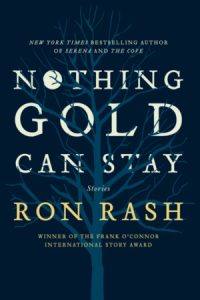Reviews
The Independent (UK) – March 30, 2013 – Five Stars review
“…Rash would no doubt give short shrift to such gender bias, but his jacket covers offer comparison to great male short story writers alone, not female ones – Carver, Steinbeck, Faulkner, Cormac McCarthy. It’s as though there’s a fault-line, separating the sexes. Yet Rash’s stories also recall Carson McCullers in their authentic rural setting, and there’s more than a hint of Shirley Jackson in the deliciously Gothic-seeming tale of the witless Englishman James Wilson, in search of near-forgotten English folk songs among the immigrants of the Appalachian Mountains… Rash’s unforgettable, beautifully crafted, sure and strong stories tap into what human beings want from each other, and want from the world…”New York Times – February 27, 2013
“…Serena,” set during the Depression, is a period piece, the kind of fiction for which Mr. Rash is best known. But “Nothing Gold Can Stay” is excitingly versatile, covering time periods from the Civil War to the present and ranging in mood from wryly comic to brutal. The 14 stories are united by clean, tough specificity, courtly backwoods diction, and a capacity for sending shivers. (Alfred Hitchcock and Rod Sterling would have loved the story “A Sort of Miracle.”)”
— Janet Maslin
Publishers Weekly – November 12, 2012
“Rash’s latest short fiction collection explores the often harsh vicissitudes of life in North Carolina. In the title story, two drug-addicted friends make plans to rob a former employer of his WWII souvenir, while “Night Hawks” features a former teacher with a self-inflicted facial scar who seeks refuge as a late-night radio DJ. Rash’s period stories, though, make the biggest impression, like the Depression-era “The Trusty,” in which a con man on a chain gang seduces a lonely farmer’s wife in the hope of using her to aid in his escape. In “The Magic Bus,” a 16-year-old country girl encounters two San Francisco hippies in a flower-painted VW microbus who entice her to run away with them. “The Dowry,” set immediately after the Civil War, relates how a pastor’s surprising sacrifice allows a young Union veteran to marry the daughter of a Confederate officer who lost his hand in battle. For a change of pace, in the humorous “A Sort of Miracle,” an accountant on an illegal bear hunt finds safety in the hands of his two slacker brothers-in-law. Although too many of the stories rely on the same basic dynamic, Rash impresses with clear-eyed, sympathetic writing about flawed and troubled characters.”
Kirkus Starred Review – October 11, 2012
Traps are embedded in the violence-streaked stories that comprise another fine collection from Rash (The Cove, 2012, etc.).
Take the excellent opening story: “The Trusty.” That’s Sinkler, the unshackled member of a chain gang in the North Carolina mountains (Rash’s invariable setting). While fetching water for the gang, the accomplished grifter sweet-talks a farmer’s young wife into eloping. She knows the hidden trails, and that’s where the tables are turned, violently. In the title story, two petty criminals, hooked on pills, steal some gold teeth. They’re about to cash in, home free, but we know they’re trapped losers, sure to be busted. There’s an actual trap, a bear trap, in “A Sort of Miracle,” the story of three knuckleheads on a mountainside. The unseen bear springs the trap and gets the ham, but the trapper dies as the black comedy intensifies. Of these 14 stories, it’s the two from the Civil War era that will haunt you. In “Where the Map Ends,” two runaway slaves are heading into the mountains, where many of the whites are Lincoln supporters. How could they have known that the farm where they shelter belongs to a man unmoored by his wife’s suicide, slipping into madness? He helps the older slave but has a horrifying end in mind for his young mixed-race companion. In “The Dowry,” the war is eight months past. Ethan fought for the Union. Now, he seeks to marry the daughter of a Confederate colonel, implacable since losing a hand on the battlefield. The story ends with a second severed hand. Also notable are “The Magic Bus,” a ’60s story in which a naïve country teenager has her disastrous first encounter with hippies, and “A Servant of History.” Here, a very green Briton, researching ancient ballads in 1922, traps himself on a remote farm by bragging about his half-remembered Scottish ancestors. What had started out lightly satirical turns very grim indeed.
Rash’s oneness with the region and its people makes an indelible impression.

